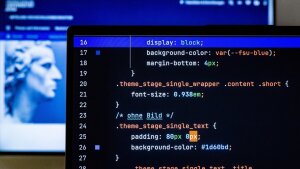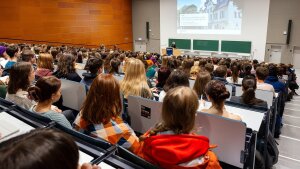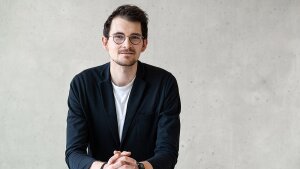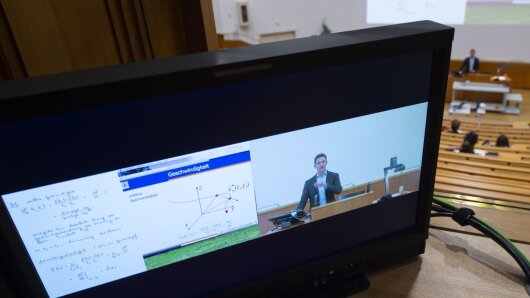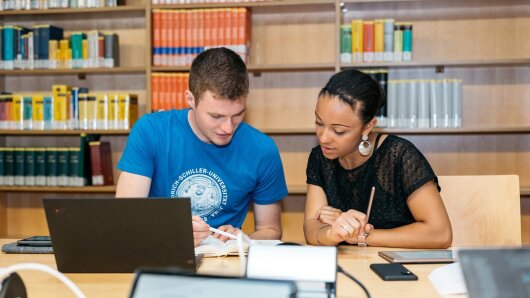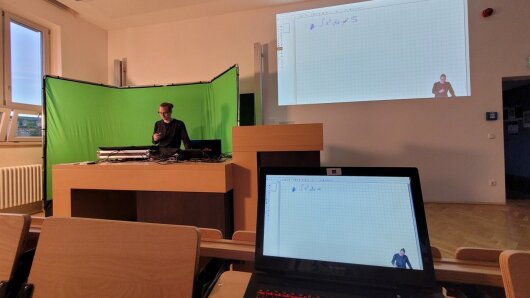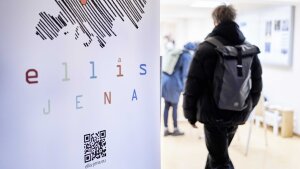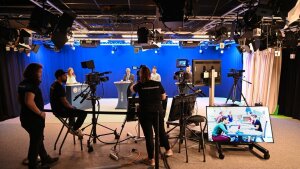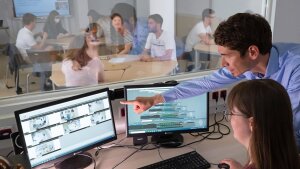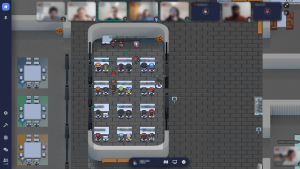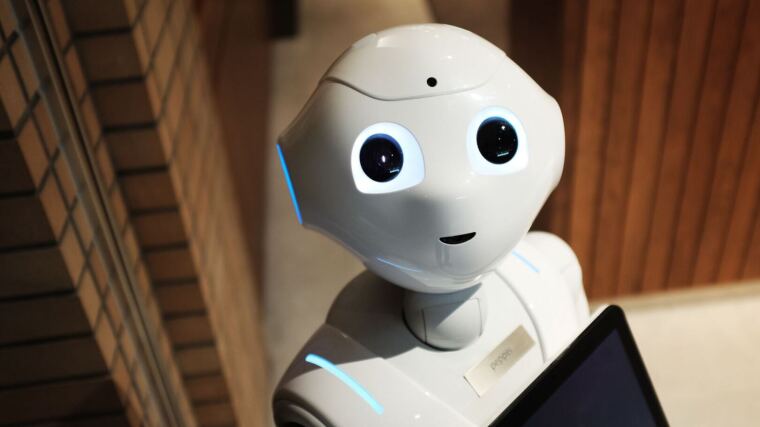
Programme code appears on a monitor and a screen in the background shows the website of the University of Jena.
Image: Jens Meyer (University of Jena)For the digital transformation, the University of Jena relies on joint strategic planning of the fields of action in research, teaching and administration. The spectrum of objectives extends from strengthening research performance, innovative teaching, studying and examining, digital access to knowledge and cultural assets to efficient and transparent work processes.
The users of the digital services are at the centre of the development and are actively involved in the strategic design. The strategy-building process does not take place in fixed periods of time, but continuously, in order to do justice to the high dynamics of innovations, user expectations and trends at all times.
Strengthening digitalized research through interdisciplinary networking
Participants at the kick-off event of the ELLIS Unit Jena.
Image: Anna SchrollUsing the latest technologies to solve complex environmental problems through the application of AI: this is what the AI Research centre for tackling global environmental problemsExternal link (ELLIS Unit Jena), funded by the German Federal Ministry of Education and Research (BMBF), is doing.
The Cluster of Excellence "Balance of the Microverse"External link aims to understand the formation and balance of microbial consortia and their interactive networks and to develop innovative solutions to combat diseases and environmental imbalances.
The Cluster of Excellence ‘Imaginamics’ aims to contribute to a better understanding of social conflicts and debates through research into social imagination.
To research safe and sustainable water supply and new water technologies, the BMBF is funding the "Thuringian Water Innovation Cluster" de (ThWIC) initiated by the University of Jena together with the Fraunhofer Institute for Ceramic Technologies and Systems (IKTS) and the Ernst Abbe University of Applied Sciences (EAH) Jena.
The AMMOD projectExternal link (of the Computer Vision Group Jena, Prof. Denzler) aims at automated recording of biodiversity, from automatic sampling, image recognition and analysis of scents and acoustic signals to the development of technologies for data archiving, visualisation and analysis.
The joint project "Nucleus Jena – A Paradise for Innovation"External link of the Friedrich Schiller University Jena and the EAH Jena aims to develop Jena into a leading transfer and innovation region in Germany and to recommend itself as a model region for similarly structured economic areas.
The Michael Stifel Center JenaExternal link (MSCJ) was founded in 2015 to continuously network scientists and strengthen their interdisciplinary exchange around digitalization. It is dedicated to data-driven and simulation-based sciences and their application from the natural sciences to the social sciences, behavioural sciences and humanities. It operates the virtual workshop on digitalization in the sciencesExternal link with funding from the Carl Zeiss Foundation and addresses fundamental questions of computer science there with the premise that breakthroughs in these areas are crucial for successful digitalization in the sciences.
Enabling innovative teaching and examining with digital media
Recording studio of the Multimedia Center of the University of Jena.
Image: Jens Meyer (University of Jena)The University of Jena offers lecturers a broad portfolio of high-performance multimedia services for digital teaching and examination.
The technical equipment of the lecture halls is continuously being expanded. To this end, the University of Jena has also participated in the development of tracking systems that enable automatic camera guidance and are based on a LiDAR system (Light Detection and Ranging, environment detection by means of laser beams). The large pool of mobile AV transmission solutions also allows conventional teaching rooms to be used flexibly as multimedia lecture halls. The technologies can be seamlessly integrated with the Moodle learning management system and the OpenCast recording system.
Beyond that, the equipment leaves hardly a wish unfulfilled: With high-speed cameras, drones for aerial shots, powerful 3D scanners, a fully equipped studio for sophisticated film productions, an easy-to-use self-recording studio and a transparent learning glass whiteboard, extensive possibilities are offered for media production in teaching.
Supporting students in digital learning
Two people at a monitor analyze persons in the next room, separated by a pane of glass.
Image: Jens Meyer (University of Jena)Digital learning requires know-how and equipment. The University of Jena therefore provides extensive support for students:
Self-management and time management, learning strategies, scientific work and presentation techniques are taught with the Digital Learning Kit. It contains interactive self-learning materials in German and English.
In the project "Digitale Lotsen" (digital guides), experienced students support their fellow students in self-directed and digital learning and the use of digital tools.
From the winter semester 2023, students will be able to network with their fellow students in digital learning communities and benefit from subject-related exchange and collaboration in small groups.
Teaching future skills in all disciplines
Lab Buddy System with highlighted components.
Image: Falko SojkaScientific findings on digitalization should be able to quickly unfold their impact in all disciplines. Elaborate teaching programmes accelerate this knowledge transfer and lay the foundation for further curricular developments:
With funding from the BMBF, the Friedrich Schiller University of Jena and the Ilmenau University of Technology are taking on the task of bundling their academic know-how on AI in a certificate programme in the THInKIExternal link joint programme and thus opening it up to students and young scientists from all disciplines.
To holistically teach and deepen the important data literacy skills, the University of Jena is developing DaLiJe, another multi-level and interdisciplinary certificate programme.
Both projects work closely with lecturers in the various departments to implement the topics in the students' courses in a sustainable way.
Funded by the German Academic Exchange Service (DAAD), the digiPHOTON project is an outstanding example of innovative digital teaching: to enable international students to conduct real laboratory experiments from afar, the remote-controlled laboratory environment XRTwinLab was developed there in collaboration with the Lichtwerkstatt Jena.
Developing digital competences through qualification and support
A typical lecture in the Abbe School of Photonics Gather.town environment
Image: Falko SojkaUsers are at the center of successful digital transformation. The University of Jena therefore offers a wide range of qualification and advisory services:
Advice for lecturers on the correct use of digital technologies from a didactic perspective is offered by the Service Centre for Higher Education Didactivs de (LehreLernen). Technical support for digital services is provided by the Multimedia Centre de. To support lecturers in the creation of digital teaching materials, students are also available as e-tutors and can expand their own experience and media skills in the process.
The Competence Center Digital Research zedif offers researchers from all disciplines central support in networking with experts and using digital tools for their own research and FAIR research data management.
Through a grant from the Foundation for Innovation in Higher Education, a marketplaceExternal link for tools and IT services, qualifications, and support services has been developed, serving as a central point of entry into the world of digital services at the University of Jena for students and lecturers alike.
Implementing service-oriented administration digitally
Pictogram showing two folders emerging from laptop screen.
Image: Adobe StockAchieving even more with existing resources: Digitalizing processes in the administration increases efficiency, creates transparency, avoids media discontinuities and thus above all: paper.
With an integrated programme of modernisation projects, the University of Jena is tackling several areas at once: A new SAP system will be introduced for the areas of finance and human resources in 2024. In the areas of students and third-party funding, the introduction of HISinOne will continue until 2028. For the digitalization of files and workflows in a document management system, the university will rely on the solution from d.velop in the future.
In application management, appointment management and many other areas, the course has already been set for a digital service-oriented administration.
Contact
Fürstengraben 27
07743 Jena
